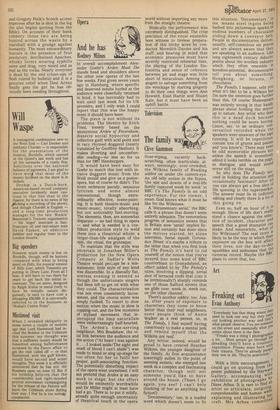Television
The family way
Clive Gammon
Nose-wiping, vacantly backscratching, often inarticulate, always, seemingly, over-crowded, the Wilkins family of Reading soldier on under the camera-eye. An old telly notion in the States, 'the ups and downs of a real-life family captured week by week' in BBC l's The Family is an odd experience. For the viewer, I mean. God knows what it must be like for the Wilkinses.
A 'documentary serial,' the BBC calls it, a phrase that doesn't seem entirely adequate. The remorseless progress of semantics means that in Britain now 'serial' implies fiction and certainly has done since 'the movies started, let alone television. Serial equals Coronation Street: it's maybe a tribute to the latter that when you first look at The Family it's hard to rid yourself of the notion that you've strayed into some kind of BBC counterblast to Granadaland, an effect added to by The Family's titles, involving a dipping, aerial shot of terraced roofs that (can it be intentionally?) sharply reminds one of those Salford streets that we glide over, week in, week out, on the other channel.
There's another oddity, too. Just as, after years of exposure to characters they come to know better than their real neighbours, some people think of Annie Walker as a real person, so, in The Family, I find myself having consciously to make a mental jerk and remind myself that the Wilkins are real.
Any writer, indeed, would be proud to have created Heather Wilkins, the younger daughter of the family. At first acquaintance loweringly sullen to the point of seeming autistic, she emerged last week as a complex and fascinating character, though still not someone you'd like to have around the house. (There I go again, you see? I can't help thinking of her as anything but fiction!) 'Documentary,' too, is a loaded word which doesn't seem to fit this situation. 'Documentary,' to me, means steel ingots being bashed into picturesque sparks or endless numbers of chocolates sliding down a conveyor belt. People in documentaries deliver.
usually, self-conscious set pieces and are always aware that they
are speaking to an audience. Like
long eighteenth century didactic poems about the woollen industry which they often resemble in boredom-potential, documentaries tell you about something: Hongkong, or locusts, or chocolates.
The Family, I suppose, tells you what it's like to be a Wilkins but
I'm sure the intention goes further
than this. Of course Shakespeare was entirely wrong in that handy
phrase about holding the mirror
up to nature. Any artist who does this is a dead duck because nothing could be more boring. Listen, say, to an ordinary co0. versation recorded when the
speakers were unaware of the tape
running. It will be repetitious, contain lots of grunts and pauses
and 'you know's.' There may even be odd memorable phrases but unless the speech is inventively
edited it looks terrible on the page, as dialogue, and would sound worse still on the stage. So why does The Family succeed in holding the attention an,c1,
occasionally fascinate? After ao,.
you can always get a free slice 01 life queuing in the supermarket. The answer must lie in judicious, editing and clearly there is a lot or this going on.
Even so, half an hour of it is enough. Slices of life don't reallY stand a chance against the selec; tion of incident, character an° speech that a good dramatist call
make. And meanwhile, what 0' the Wilkinses? The real story is likely to be the way in which theirt exposure on the box will affec their lives, not the day-to-daY squabbles and sadnesses that al!. cameras record. Maybe the BB' plans to cover that, too.


































 Previous page
Previous page